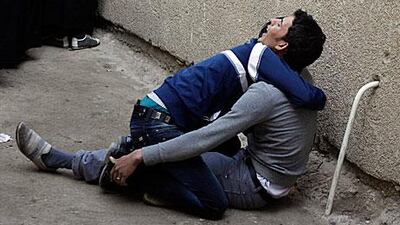BAGHDAD // At least 72 people died in coordinated bomb attacks on Shiite pilgrims and neighbourhoods in Iraq yesterday on the bloodiest day since US forces withdrew from the country.
Explosions struck two Shiite areas in Baghdad early in the morning, killing at least 27. A few hours later, 45 died in a suicide attack on pilgrims heading for Karbala.
Since American troops left on December 18 there has been a wave of bombings, mostly targeting Shiites, threatening to drag Iraq back towards the sectarian conflict that ravaged the country after the US-led invasion that toppled Saddam Hussein.
The situation has been exacerbated by a political crisis pitting politicians from the Shiite majority who dominate the government against the Sunni minority, who reigned supreme under the dictatorship of Saddam.
There was no claim of responsibility for the bloodshed but the bombings carried the hallmarks of Sunni insurgents linked to al Qaeda.
The attacks began in Baghdad with the explosion of a bomb attached to a motorcycle near a bus stop where labourers gather to look for work in the Shiite Sadr City neighbourhood.
That attack was followed by the explosion of a roadside bomb. Police found a third bomb nearby and defused it. Less than two hours later, two explosions went off simultaneously in the Shiite neighbourhood of Kazimiyah in the north of the capital.
“I saw too much blood flood on to streets and bodies thrown to the side of the road,” said Abo Faris, who owns a shop near one of the bomb sites in Kazimiyah.
“They targeted a crowded Shia place. I’m sure now al Qaeda is strong and they can attack any day, any time.”
The attack on the pilgrims took place near Nasiriyah, about 320 kilometres south-east of Baghdad, in the run-up to Arbaeen, a Shiite holy day marking the end of 40 days of mourning that follow the anniversary of the death of Imam Hussein. During this time, Shiite pilgrims from across Iraq make their way to Karbala, south of Baghdad.
hmed Abdel Saheb Khaqani, director of the Hussein General Hospital in Nasiriyah, where the dead and injured were taken, said two suicide bombers wearing explosive belts blew themselves up and a bomb hidden by the road also exploded.
Baghdad military spokesman Maj Gen Qassim Al Moussawi said the aim of the attacks was “to create turmoil among the Iraqi people”. He said it was too early to say who was behind them.
The bombings were the deadliest in Baghdad since December 22, when a series of explosions killed 69 people in mostly Shiite neighbourhoods. An al Qaeda front group in Iraq claimed responsibility.
The increased violence comes as sectarian tensions have heightened after the Shiite prime minister Nouri Al Maliki’s government issued an arrest warrant for the country’s top Sunni politician last month.
Tariq Al Hashemi, the vice president, is in Iraq’s semiautonomous Kurdish region in the north, out of reach of state security forces.
Iraqi leaders feared a resurgence of Sunni and Shiite militants and an increase in violence after the US pullout, a fear that is coming to be realised.
On Wednesday, attacks targeted the homes of police officers and a member of a government-allied militia. Those attacks, in the city of Baqouba and the area of Abu Ghraib just outside Baghdad, killed four people, including two children.
Nouri Al Dulaimi, a former major-general in the Iraqi army, said the political conflict was fuelling the violence.
“Iraqi politics is in open war and that was reflected on the Iraqi streets through … today’s bombs,” he said.
Hakim Al Zamili, an MP from the Ahrar bloc, which is loyal to the radical Sadrist movement, blamed the recent attacks on cells belonging to al Qaeda and Baathists from the former regime.
“Al Qaeda and the Baathists are trying by all means available to them stoke dissension and sectarian war between Iraqi sects, and today’s bombs were just a proof of how strongly they want a civil war,” said Mr Al Zamili, a member of parliament’s security and defence committee.
“We must rebuild our security forces.”
* With additional reporting by the Associated Press

